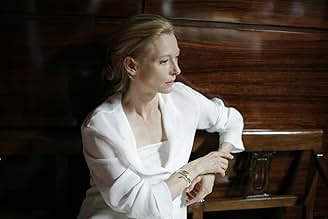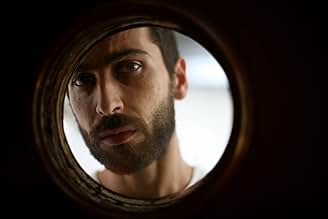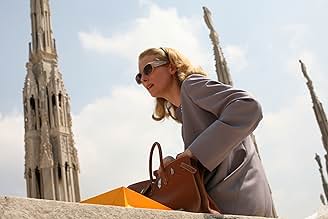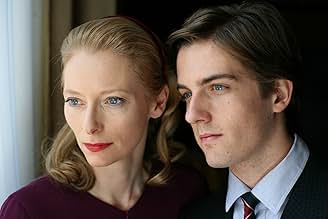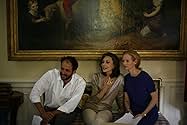IMDb RATING
7.0/10
25K
YOUR RATING
Emma left Russia to live with her husband in Italy. Now a member of a powerful industrial family, she is the respected mother of three, but feels unfulfilled. One day, Antonio, a talented ch... Read allEmma left Russia to live with her husband in Italy. Now a member of a powerful industrial family, she is the respected mother of three, but feels unfulfilled. One day, Antonio, a talented chef and her son's friend, makes her senses kindle.Emma left Russia to live with her husband in Italy. Now a member of a powerful industrial family, she is the respected mother of three, but feels unfulfilled. One day, Antonio, a talented chef and her son's friend, makes her senses kindle.
- Nominated for 1 Oscar
- 16 wins & 47 nominations total
Featured reviews
When have you felt most alone?
Milan. Winter. Upper-middle classes,Northern Italy. A dizzying array of people who all know each other and we don't.
Speaking about I Am Love, Tilda Swinton remarks, "Overcoming the idea of oneself, as created by society, has been one of my main interests since Orlando." In that earlier film, which was based on a novel by Virginia Woolf, Swinton's character self-reflected by seeing how society views her through different time periods and even a gender change. In I Am Love, Emma (Swinton) connects with love as a revolutionary force and throws off the shackles of a persona forced on her by circumstance.
I Am Love is unusual as an art film in that it is set in a world of exquisite luxury and good taste. It is not the simplistic attack on bourgeoisie we might at first expect. Working out the underlying moral fabric requires effort (but is richly rewarded). Love, or Emma, is no martyr to idealism. Revolution (of the social order) – or love – can only be justified by its success. Even the cinematic temptation to tragedy will extolled and then dashed through with a sword.
Russian-born Emma is Tancredi's wife. Tancredi co-inherits the family textile fortunes with his son Edo. Emma, although head of the household, is something of a show wife. With style and authority, but no clearly defined role in terms of business or of culture. The traditions and values of Tancredi's father for the former have maybe skipped a generation to the untried Edo. For the latter, to his sister and artist-photographer, Betta.
Secondary characters quickly provide clues to the theme. Edo's friend Antonio is an innovative, high class chef. Cuisine elicits a life-fulfilling passion in him for perfection and meaning. And Betta has a life of her own of which the parents suspect little. "Only you love me for who I really am," she tells Emma.
A superficial reading of I Am Love could leave the viewer with the impression of tragedy in which love has terrible consequences. It is essential to analyse what one actually sees (rather than a Hollywood ending that would have emphasised different points entirely). One can then imagine conversations over glasses of chablis, berating the section where the film goes 'oh so Lady Chatterley,' oblivious to how the film attacks that very same self-satisfied air of culture without visceral involvement. Even an interest in Swinton's breasts disguised by trappings of intellectual analysis. More lowbrow cinema-goers could feel even more frustrated at the 'missed opportunities' for histrionics, the emotional 'involvement' that comes from more manipulative screen writing.
I Am Love is social melodrama in the best traditions of Italian cinema. It lines up, surprisingly, more with works like L'avventura and that film's quest for self, than the compassionate criticism of an elite class in Il Gattopardo (The Leopard). In I Am Love, good taste and refinement is simply the medium for those with an ability and wherewithal to appreciate it – epitomised by Tancredi's father, his son, but perhaps not Tancredi himself. It carries no moral connotation. Empty shells on the other hand, form without substance, ultimately and unknowingly seeks its own destruction.
Tilda Swinton's career has forged a extraordinary path. In mainstream cinema, she has been hailed for work like Michael Clayton which, while impressive, hardly shows her skill in portraying worthwhile values (compared, say, to her portrait in Stephanie Daley). Or her powerhouse as an actress, in challenging cinephile gems such as The Man From London. I Am Love has potential to reach a wider, discerning audience, than her Bela Tarr movie, being shown not only in art house but as least one multiplex chain. It has an arresting, and rather beautiful romance at its heart, and one that becomes a striking metaphor for finding one's true course in life. It is ascetically 'thinking person's cinema' yet lovers of fine things can luxuriate in the sumptuous sets and costumes that inhabit art history and couture (Silvia Fendi, third generation of the famous luxury brand, was also an associate producer on the movie). Music is by Pulitzer Prize winning composer John Adams, and the perfectly choreographed closing scenes have almost operatic intensity.
One of the pleasures of writing a review is the opportunity to think a more deeply about the film - when one has to put words to paper. Only when forced to analyse the story, to separate the expected from what really happened, did I truly appreciate it. Swinton's Emma is no modern-day Madame Bovary. Style, plot and execution is far less predictable than it seems. Clichés of rich-poor, virgin-whore, as well as cinematic tropes that have become stale are effortlessly avoided. Confusing feelings are not indicated by fast cuts, but by unrelentingly staring at the character struggle in a long take.
I particularly like Swinton's power for creating interiorisation. This is visual acting at its best, showing what is going on in her head without having it spelt out. There are moments of exultation when she can barely contain herself. And moments when she struggles to stay on course – as we should, if we want to keep up. We find ourselves transfixed by her face in the bathroom. A place of privacy, where she can almost admit to herself the jubilation at a stolen kiss. And, like the art book she forgets to pay for, full of future portent. Or the moments when she is torn, at the climax of the film. The difficult self-examination in the midst of events. When Tancredi summons damnation in the words, "You don't exist," she has passed the point where she might cling to merely existing. Freedom is the power to 'go,' and to 'do.' Any avowedly lightweight cinemagoer might complain that the deaths are not dramatic enough. The cinematography not stark enough (to make us gasp in awe every few seconds at the beautiful surroundings) or the dialogue not self-explanatory enough.
Milan. Winter. Upper-middle classes,Northern Italy. A dizzying array of people who all know each other and we don't.
Speaking about I Am Love, Tilda Swinton remarks, "Overcoming the idea of oneself, as created by society, has been one of my main interests since Orlando." In that earlier film, which was based on a novel by Virginia Woolf, Swinton's character self-reflected by seeing how society views her through different time periods and even a gender change. In I Am Love, Emma (Swinton) connects with love as a revolutionary force and throws off the shackles of a persona forced on her by circumstance.
I Am Love is unusual as an art film in that it is set in a world of exquisite luxury and good taste. It is not the simplistic attack on bourgeoisie we might at first expect. Working out the underlying moral fabric requires effort (but is richly rewarded). Love, or Emma, is no martyr to idealism. Revolution (of the social order) – or love – can only be justified by its success. Even the cinematic temptation to tragedy will extolled and then dashed through with a sword.
Russian-born Emma is Tancredi's wife. Tancredi co-inherits the family textile fortunes with his son Edo. Emma, although head of the household, is something of a show wife. With style and authority, but no clearly defined role in terms of business or of culture. The traditions and values of Tancredi's father for the former have maybe skipped a generation to the untried Edo. For the latter, to his sister and artist-photographer, Betta.
Secondary characters quickly provide clues to the theme. Edo's friend Antonio is an innovative, high class chef. Cuisine elicits a life-fulfilling passion in him for perfection and meaning. And Betta has a life of her own of which the parents suspect little. "Only you love me for who I really am," she tells Emma.
A superficial reading of I Am Love could leave the viewer with the impression of tragedy in which love has terrible consequences. It is essential to analyse what one actually sees (rather than a Hollywood ending that would have emphasised different points entirely). One can then imagine conversations over glasses of chablis, berating the section where the film goes 'oh so Lady Chatterley,' oblivious to how the film attacks that very same self-satisfied air of culture without visceral involvement. Even an interest in Swinton's breasts disguised by trappings of intellectual analysis. More lowbrow cinema-goers could feel even more frustrated at the 'missed opportunities' for histrionics, the emotional 'involvement' that comes from more manipulative screen writing.
I Am Love is social melodrama in the best traditions of Italian cinema. It lines up, surprisingly, more with works like L'avventura and that film's quest for self, than the compassionate criticism of an elite class in Il Gattopardo (The Leopard). In I Am Love, good taste and refinement is simply the medium for those with an ability and wherewithal to appreciate it – epitomised by Tancredi's father, his son, but perhaps not Tancredi himself. It carries no moral connotation. Empty shells on the other hand, form without substance, ultimately and unknowingly seeks its own destruction.
Tilda Swinton's career has forged a extraordinary path. In mainstream cinema, she has been hailed for work like Michael Clayton which, while impressive, hardly shows her skill in portraying worthwhile values (compared, say, to her portrait in Stephanie Daley). Or her powerhouse as an actress, in challenging cinephile gems such as The Man From London. I Am Love has potential to reach a wider, discerning audience, than her Bela Tarr movie, being shown not only in art house but as least one multiplex chain. It has an arresting, and rather beautiful romance at its heart, and one that becomes a striking metaphor for finding one's true course in life. It is ascetically 'thinking person's cinema' yet lovers of fine things can luxuriate in the sumptuous sets and costumes that inhabit art history and couture (Silvia Fendi, third generation of the famous luxury brand, was also an associate producer on the movie). Music is by Pulitzer Prize winning composer John Adams, and the perfectly choreographed closing scenes have almost operatic intensity.
One of the pleasures of writing a review is the opportunity to think a more deeply about the film - when one has to put words to paper. Only when forced to analyse the story, to separate the expected from what really happened, did I truly appreciate it. Swinton's Emma is no modern-day Madame Bovary. Style, plot and execution is far less predictable than it seems. Clichés of rich-poor, virgin-whore, as well as cinematic tropes that have become stale are effortlessly avoided. Confusing feelings are not indicated by fast cuts, but by unrelentingly staring at the character struggle in a long take.
I particularly like Swinton's power for creating interiorisation. This is visual acting at its best, showing what is going on in her head without having it spelt out. There are moments of exultation when she can barely contain herself. And moments when she struggles to stay on course – as we should, if we want to keep up. We find ourselves transfixed by her face in the bathroom. A place of privacy, where she can almost admit to herself the jubilation at a stolen kiss. And, like the art book she forgets to pay for, full of future portent. Or the moments when she is torn, at the climax of the film. The difficult self-examination in the midst of events. When Tancredi summons damnation in the words, "You don't exist," she has passed the point where she might cling to merely existing. Freedom is the power to 'go,' and to 'do.' Any avowedly lightweight cinemagoer might complain that the deaths are not dramatic enough. The cinematography not stark enough (to make us gasp in awe every few seconds at the beautiful surroundings) or the dialogue not self-explanatory enough.
The ever-versatile Tilda Swinton stars as a Russian-born Italian in Luca Guadagnino's film 'I am Love', which is beautifully filmed, well-observed and acted with a nice sense of understatement. Yet this tale of a wealthy family suffers somewhat from the basic irrelevance of its drama. Being happy is a challenge for everyone, even for the rich, but a story where the characters are essentially free to choose their own lives can feel slight, and although part of the point here is that the individuals concerned are prisoners of their own privilege, the point is made without any satirical venom - the tears of the servant, crying over the departure of her mistress at the end of the film, are shown without irony. Although there are details to enjoy here, I found it hard to sympathise with any of the characters over any of the others. It's not a bad film, but a social dimension to match its emotional one might have added to its impact.
Attempting to revive the golden age of Italian cinema that featured such greats as Rossellini, Fellini, Visconti, Pasolini, and others, Luca Guadagnino has fashioned a sumptuous, elegant, and physically beautiful film called I Am Love or in its Italian title Lo Sono Amore. Unfortunately, while the film has moments of emotional power, it fails to coalesce into a satisfying whole and ends up feeling more pretentious than penetrating.
Written by Barbara Alberti, Ivan Cotroneo, Walter Fasano and Guadagnino and based on a story by the director, the film begins in snowy Milan in the winter. The very wealthy Recchi family, owners of a textile factory that it is hinted supported Musolini and the Fascists during the war, is having a dinner party in their aristocratic house catered by a host of servants wearing white gloves. The elderly grandfather and patriarch of the family Edoardo Sr. (Gabrielle Ferzetti) is about to retire, evoking the Visconti film, The Leopard. Shockwaves roll throughout the gathering, however, when he names both his son Tancredi (Pippo Delbono) and his handsome grandson Edo (Flavio Parenti) as joint controllers of the business. Befitting the family's pride, when Edo tells the group that he has come in second in a race, the elderly patriarch says "The Recchis never lose." The Russian born Emma (Tilda Swinton) is Tancredi's wife and mother of three grown children, sons Edo and Gianluca (Mattia Zacarro), and artist and photographer daughter Betta (Alba Rohrwacher). Though on the surface she is a loyal and supporting wife and mother and has made a complete adjustment to the Italian bourgeois way of life, underneath there is a growing boredom and discontent as sensed by her servant Ida (Maria Paiato). We get a hint of this stirring when daughter Betta reveals to her that she is a Lesbian and is in love with a fellow classmate in England. The longing for adventure crystallizes further when she meets Edo's friend Antonio (Edoardo Gabbriellini) who is a master chef who is planning to open a restaurant with Edo.
Joining her mother-in-law Allegra (Marisa Berenson) and Edo's girl friend Eva (Diane Fleri) for lunch, Emma's senses are fully awakened while eating prawns prepared by Antonio. Passing through San Remo on a trip to Nice to attend an exhibition to which she has been invited by daughter Betta, Emma unexpectedly bumps into Antonio who eagerly invites her to view the restaurant site. Despite the fact that Antonio is probably 10 to 15 years younger than her, this chance encounter leads to a bursting forth of Emma's tightly controlled sexual inhibitions and a swirl of passionate lovemaking in the rustic countryside, their engaged body parts mirrored by close-up shots of flowers and insects in a very poetic but overly aestheticized manner.
Reminiscent of Ibsen's 1879 play The Doll's House, the main thrust of the film is the repression of an upper class woman who suddenly discovers that there should be more zest to her life, presumably triggered by her daughter's openness in discussing her sexual preference. The love affair, however, triggers many changes in the Recchi family, both economically and psychologically. Tancredi is forced to sell their business to an Indian investor who explains that "capitalism is democracy". The scenes in London with the financiers are very strong but are treated as a minor sub-plot with the emphasis quickly given over to the family's psychological distress.
When Edo puts two and two together and realizes his mother's sexual adventures with his best friend, the result is tragedy for the entire family, a series of events handled by the director in an involving but melodramatic fashion. Though Emma has been praised by some for the courage she shows in breaking away from a static marriage, one wonders if a greater courage would perhaps have been shown if she had gotten in touch with the love she once had for her husband, fulfilled her solemn oath, "till death do us part", and resumed her responsibilities as a caring mother. While I was moved by much of the visual beauty of the film and the idea of breaking with tradition and listening to the voices within, I was infrequently emotionally involved with the characters and I Am Love felt distant and often contrived.
Written by Barbara Alberti, Ivan Cotroneo, Walter Fasano and Guadagnino and based on a story by the director, the film begins in snowy Milan in the winter. The very wealthy Recchi family, owners of a textile factory that it is hinted supported Musolini and the Fascists during the war, is having a dinner party in their aristocratic house catered by a host of servants wearing white gloves. The elderly grandfather and patriarch of the family Edoardo Sr. (Gabrielle Ferzetti) is about to retire, evoking the Visconti film, The Leopard. Shockwaves roll throughout the gathering, however, when he names both his son Tancredi (Pippo Delbono) and his handsome grandson Edo (Flavio Parenti) as joint controllers of the business. Befitting the family's pride, when Edo tells the group that he has come in second in a race, the elderly patriarch says "The Recchis never lose." The Russian born Emma (Tilda Swinton) is Tancredi's wife and mother of three grown children, sons Edo and Gianluca (Mattia Zacarro), and artist and photographer daughter Betta (Alba Rohrwacher). Though on the surface she is a loyal and supporting wife and mother and has made a complete adjustment to the Italian bourgeois way of life, underneath there is a growing boredom and discontent as sensed by her servant Ida (Maria Paiato). We get a hint of this stirring when daughter Betta reveals to her that she is a Lesbian and is in love with a fellow classmate in England. The longing for adventure crystallizes further when she meets Edo's friend Antonio (Edoardo Gabbriellini) who is a master chef who is planning to open a restaurant with Edo.
Joining her mother-in-law Allegra (Marisa Berenson) and Edo's girl friend Eva (Diane Fleri) for lunch, Emma's senses are fully awakened while eating prawns prepared by Antonio. Passing through San Remo on a trip to Nice to attend an exhibition to which she has been invited by daughter Betta, Emma unexpectedly bumps into Antonio who eagerly invites her to view the restaurant site. Despite the fact that Antonio is probably 10 to 15 years younger than her, this chance encounter leads to a bursting forth of Emma's tightly controlled sexual inhibitions and a swirl of passionate lovemaking in the rustic countryside, their engaged body parts mirrored by close-up shots of flowers and insects in a very poetic but overly aestheticized manner.
Reminiscent of Ibsen's 1879 play The Doll's House, the main thrust of the film is the repression of an upper class woman who suddenly discovers that there should be more zest to her life, presumably triggered by her daughter's openness in discussing her sexual preference. The love affair, however, triggers many changes in the Recchi family, both economically and psychologically. Tancredi is forced to sell their business to an Indian investor who explains that "capitalism is democracy". The scenes in London with the financiers are very strong but are treated as a minor sub-plot with the emphasis quickly given over to the family's psychological distress.
When Edo puts two and two together and realizes his mother's sexual adventures with his best friend, the result is tragedy for the entire family, a series of events handled by the director in an involving but melodramatic fashion. Though Emma has been praised by some for the courage she shows in breaking away from a static marriage, one wonders if a greater courage would perhaps have been shown if she had gotten in touch with the love she once had for her husband, fulfilled her solemn oath, "till death do us part", and resumed her responsibilities as a caring mother. While I was moved by much of the visual beauty of the film and the idea of breaking with tradition and listening to the voices within, I was infrequently emotionally involved with the characters and I Am Love felt distant and often contrived.
Greetings again from the darkness. A really good film from writer/director Luca Guadagnino and a terrific performance from Tilda Swinton. The film centers on power and family and trust and self-discovery ... and the complexities of each.
As a young, working class Russian, Emma (Tilda Swinton) is whisked away to marriage and life in the aristocracy of Milan. She dutifully raises her kids and organizes huge dinners and parties at their mansion as the Rechhi's entertain business clients and their own family. It is during these parties that we realize Emma is technically part of the family, but really is still an outsider. She escapes to her own space once the events are running smoothly.
Being an avid cook herself, she easily clicks with a brilliant young chef introduced to the family by her own son. Very little doubt where it's headed at this point as Emma unleashes the pent up energy she has been forced to hide. While we are very aware that the upper crust has learned to look the other way with infidelity, that's not the case with the Rechhi's and their Russian wife/mother.
The brilliance in the film is that it shows how the younger generation doesn't really fit any better than Emma. The difference is that they are part of the fabric and will be allowed more rope than an outsider. Still it is painful to watch Emma and her son, who can't quite adapt to the family business. Better yet, to watch her with her daughter, who confesses her preference for other women. Emma sees herself in these two, but doesn't have the same freedom. Her best ally is the caretaker who seems to understand the multiple levels on which this family functions.
Fascinating interactions and complex writing make this a film for film lovers. There is so little dialogue, but so much is said with a glance or head nod. Many U.S. writers could learn a thing or two. Must also mention the startling score by John Adams. It is quite operatic, which plays along with the themes of the film.
As a young, working class Russian, Emma (Tilda Swinton) is whisked away to marriage and life in the aristocracy of Milan. She dutifully raises her kids and organizes huge dinners and parties at their mansion as the Rechhi's entertain business clients and their own family. It is during these parties that we realize Emma is technically part of the family, but really is still an outsider. She escapes to her own space once the events are running smoothly.
Being an avid cook herself, she easily clicks with a brilliant young chef introduced to the family by her own son. Very little doubt where it's headed at this point as Emma unleashes the pent up energy she has been forced to hide. While we are very aware that the upper crust has learned to look the other way with infidelity, that's not the case with the Rechhi's and their Russian wife/mother.
The brilliance in the film is that it shows how the younger generation doesn't really fit any better than Emma. The difference is that they are part of the fabric and will be allowed more rope than an outsider. Still it is painful to watch Emma and her son, who can't quite adapt to the family business. Better yet, to watch her with her daughter, who confesses her preference for other women. Emma sees herself in these two, but doesn't have the same freedom. Her best ally is the caretaker who seems to understand the multiple levels on which this family functions.
Fascinating interactions and complex writing make this a film for film lovers. There is so little dialogue, but so much is said with a glance or head nod. Many U.S. writers could learn a thing or two. Must also mention the startling score by John Adams. It is quite operatic, which plays along with the themes of the film.
During the past decade, Tilda Swinton has proved herself to be a very adept actress. I've never heard of Luca Guadagnino, but their collaboration "Io sono l'amore" ("I Am Love" in English) presents an interesting and slightly chilling look at a wealthy Italian family.
The focus is the fictional Recchi clan in Milan, and Emma (Swinton) is a Russian woman who married into the family and pretty much turned her back on her Slavic identity. Her husband Tancredi (Pippo Delbono) is the son of industrialist Edoardo (Gabrielle Ferzetti), for whom a party is thrown where he announces that he is handing the business to his son.
By this point, it starts to become apparent that Emma's life feels incomplete. Maybe it's the weirdness of a life where one is always surrounded by extended family and getting waited on hand and foot - and how the extended family seems determined to organize all relationships - or maybe it's the surprise at learning of her daughter Elisabetta's (Alba Rohrwacher) lesbianism. But when Emma's son Edoardo Jr. (Flavio Parenti) introduces her to chef Antonio (Edoardo Gabriellini), who prepared the cake, this begins a new chapter in Emma's life.
Throughout the movie, it seemed that the food acted as a metaphor: Emma was starting to taste a whole side of her existence about which she'd never known. Maybe the food and other visuals were a little overstated throughout the movie, but I think that the end result was a good one. To be certain, there was a scene in the movie that made me feel as though I'd just stopped breathing - you'll know it when you see it - and I think that what Emma does at the end is the only thing that she could have done. I recommend the movie.
PS: Marisa Berenson, who plays Allegra, previously starred in "Death in Venice" and "Cabaret". She is the sister of actress Berry Berenson, who married "Psycho" star Anthony Perkins and was in one of the planes that crashed into the World Trade Center on September 11, 2001.
The focus is the fictional Recchi clan in Milan, and Emma (Swinton) is a Russian woman who married into the family and pretty much turned her back on her Slavic identity. Her husband Tancredi (Pippo Delbono) is the son of industrialist Edoardo (Gabrielle Ferzetti), for whom a party is thrown where he announces that he is handing the business to his son.
By this point, it starts to become apparent that Emma's life feels incomplete. Maybe it's the weirdness of a life where one is always surrounded by extended family and getting waited on hand and foot - and how the extended family seems determined to organize all relationships - or maybe it's the surprise at learning of her daughter Elisabetta's (Alba Rohrwacher) lesbianism. But when Emma's son Edoardo Jr. (Flavio Parenti) introduces her to chef Antonio (Edoardo Gabriellini), who prepared the cake, this begins a new chapter in Emma's life.
Throughout the movie, it seemed that the food acted as a metaphor: Emma was starting to taste a whole side of her existence about which she'd never known. Maybe the food and other visuals were a little overstated throughout the movie, but I think that the end result was a good one. To be certain, there was a scene in the movie that made me feel as though I'd just stopped breathing - you'll know it when you see it - and I think that what Emma does at the end is the only thing that she could have done. I recommend the movie.
PS: Marisa Berenson, who plays Allegra, previously starred in "Death in Venice" and "Cabaret". She is the sister of actress Berry Berenson, who married "Psycho" star Anthony Perkins and was in one of the planes that crashed into the World Trade Center on September 11, 2001.
Director's Trademarks: The Films of Luca Guadagnino
Director's Trademarks: The Films of Luca Guadagnino
Suspiria director Luca Guadagnino takes IMDb through his approach to filmmaking, from longtime collaborator Tilda Swinton, to why he hopes he doesn't have a "style."
Did you know
- TriviaLead actress Tilda Swinton learned both Italian and Russian for the part, neither of which she spoke before filming.
- GoofsWhen Edoardo and Elisabetta meet in London, there's a lot of shadow on the pavement. When they walk away together in the next shot, there's a lot more sun. But the weather can change quickly in the UK.
- Quotes
Elisabetta Recchi: Happy is a word that makes one sad.
- ConnectionsFeatured in At the Movies: Venice Film Festival 2009 (2009)
- How long is I Am Love?Powered by Alexa
Details
- Release date
- Country of origin
- Official sites
- Languages
- Also known as
- Yo soy el amor
- Filming locations
- Villa Necchi Campiglio, Milan, Lombardia, Italy(Recchis' villa)
- Production companies
- See more company credits at IMDbPro
Box office
- Budget
- €3,600,000 (estimated)
- Gross US & Canada
- $5,005,465
- Opening weekend US & Canada
- $121,504
- Jun 20, 2010
- Gross worldwide
- $12,747,768
- Runtime2 hours
- Color
- Sound mix
- Aspect ratio
- 1.85 : 1
Contribute to this page
Suggest an edit or add missing content





